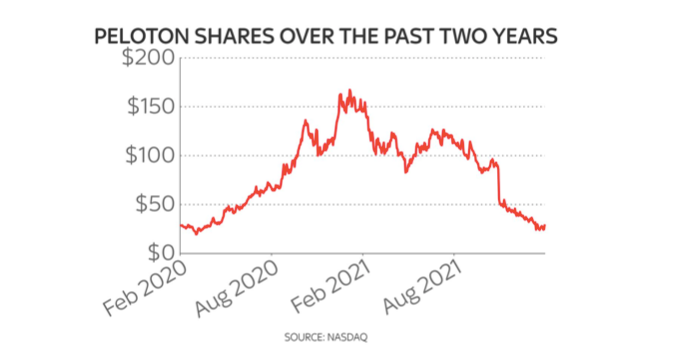A Crisis Brings Clarity About What Is Truly Important, By DesignStudio’s Mark Liney
By: Mark Liney, Group CEO of DesignStudio
The role of brand strategy can be wildly overstated. But a good brand strategy, one that has genuinely been woven through every facet of an organisation, is invaluable in moments of crisis. As we enter another period of economic uncertainty, every brand will be considering how they deal with the challenges that come with a looming global recession, continued global supply chain issues, recruitment and more. So, how have powerful strategies steered brands through periods of turmoil, and what’s the impact when strategy doesn’t consistently permeate every touchpoint of the business?
At the height of the pandemic you’d be lucky to get a new Peloton Bike+ in under 10 weeks. As gym doors shuttered and we were forced into our homes, the uptake of Peloton products was extraordinary. Business boomed. In 2020, sales jumped over 170%, the business announced its first ever quarterly profit and the share price was up over 220%.
Sustaining these levels of growth was always going to be challenging, yet when frequently questioned on the reason for their optimism in a post-pandemic world, Peloton leadership would state “this is better equipment, better service, better value and at a better place — home. All in all, Peloton is the better experience — we think that wins long term.”
Fast forward to today, and we’re fresh off the back of Peloton’s fourth round of layoffs this year. This latest round, a further 500 cuts, follows the axing of 800+ in August and 2,800+ in February. All part of Barry McCarthy’s “$800 million restructuring plan”.

This isn’t a criticism of the running of the Peloton business. What has struck me though is the nature of the communication from the leadership through this journey. Specifically, the lack of any value that the brand was able to provide in this context.
“Cash is oxygen”
One of the sources of power that propelled the Peloton business into its ascendancy was the strength of its community — the love and passion that its users and employees had for the brand. Or indeed the adoration that users had for their instructors, with whom they felt comfortable enough to share deeply personal stories of their journey.
As one instructor, Leanne Hainsby, stated: “There’s a level of intimacy because you’re in these people’s homes, and so if they’re taking your class every day they feel like they know you and want to connect”.
Peloton has fostered a level of passion across its community that most real-life fitness pursuits can only dream of and it has done so on a scale that few could replicate.

Yet it’s this strength that makes the brand’s communication all the more baffling. In a supposedly leaked employee memo back in August, following the round of 800 redundancies, CEO Barry McCarthy spoke of the significant progress they were making in their restructuring plan.
He spoke of “eliminating” various teams and roles, an ongoing “analysis of our workforce and expenditures”, “running the business to maximize cash flow” and a need to get comfortable with this new reality — “change is constant, we need to embrace it”.
No message rang more clearly though than McCarthy stating “these changes are essential if Peloton is ever going to become cash flow positive. Cash is oxygen. Oxygen is life.”
Cash is oxygen.
Oxygen is life.
Cold hard cash and nothing but business.
How can a brand so famed for its ability to create genuine, deep and intimate connection with its community now appear so tone deaf?
The role of brand strategy in a crisis
From 10,000ft, Peloton felt like it had nothing to grab hold of at this moment. All of the warmth that the brand had become famed for seemed entirely absent from its leadership and internal communications. There was, and appears still, no compass guiding tonality or informing their decisions.
Compare this to Airbnb, a global and enduring benchmark in effective brand strategy. Their 2014 rebrand centred on the idea of ‘Belong Anywhere’ — a belief that no matter where you wanted to venture in the world, with Airbnb you could feel a true sense of belonging.
Few ideas have been so expertly and energetically woven through a business as ‘Belong Anywhere’ has been through Airbnb. It’s testament to its leadership and their belief in the value of brand, but more importantly to each of its employees for their energy and commitment to bringing it to life day in, day out.

In May 2020 as the COVID pandemic was peaking, Brian Chesky had to address his global team of approximately 7,500 to inform them that nearly 1,900 teammates would have to leave Airbnb, comprising around 25% of the company.
What followed was a beautifully articulate, humble and empathetic piece of communication that will long-stand as a best-in-class example of crisis communications.
The fundamental difference between Airbnb and Peloton in this context is the very clear centre of gravity that Airbnb had in its communication. Even in these most challenging of moments, ‘Belong Anywhere’ sits proudly front and centre.
Chesky talked with sincerity and authenticity about how “we are collectively living through the most harrowing crisis of our lifetime” and how such situations are incredibly difficult to confront “for a company like us whose mission is centered around belonging”.
He provided insight on the organisation’s plan to navigate this period, stating “when we started Airbnb, it was about belonging and connection. This crisis has sharpened our focus to get back to our roots, back to the basics, back to what is truly special about Airbnb.”
He goes on to outline the principles by which they reached this decision, as well as providing specifics on the generous severance packages the company would provide to “take care of those that are leaving”.
Towards the end of the memo, Chesky offers a genuine apology to those leaving the business.
“I am truly sorry. Please know this is not your fault. The world will never stop seeking the qualities and talents that you brought to Airbnb…that helped make Airbnb. I want to thank you, from the bottom of my heart, for sharing them with us.”
Airbnb did not find itself here through poor decision making and bad management, instead it exists within one of the industries most affected by the pandemic. And yet, there is still a sense of ownership and humility in these moments.
Peloton on the other hand, finds itself in its current position as a result of betting big. Betting that the pandemic-induced spike in orders was the new normal. Not by McCarthy, but such hubris must be difficult to look back on for many.
Chesky concludes that “a crisis brings you clarity about what is truly important”. In reading his memo, it’s abundantly clear what that is to Airbnb. And while there is a clear understanding that their moves carried a similar motivation to that of Peloton’s (i.e. financial sustainability), you’re left with a sense that there’s something more important than just making money.
If Peloton is to preserve any sense of its own community as it (hopefully) emerges from this crisis, McCarthy will need to rethink the approach.
In this economically uncertain time, this should be a lesson for brands the world over. They need to question if the brand’s foundations are sufficiently built to sustain periods of turmoil. They need to understand the compelling factors beyond the bottom line that will genuinely inform their decisions. Doing so can help ensure that the business emerging from these moments will still have the equity and qualities necessary for it to thrive in its future state.
Airbnb’s post-pandemic success is testament to this approach. As for Peloton, the next six months will tell us if there’s anything left to salvage.





